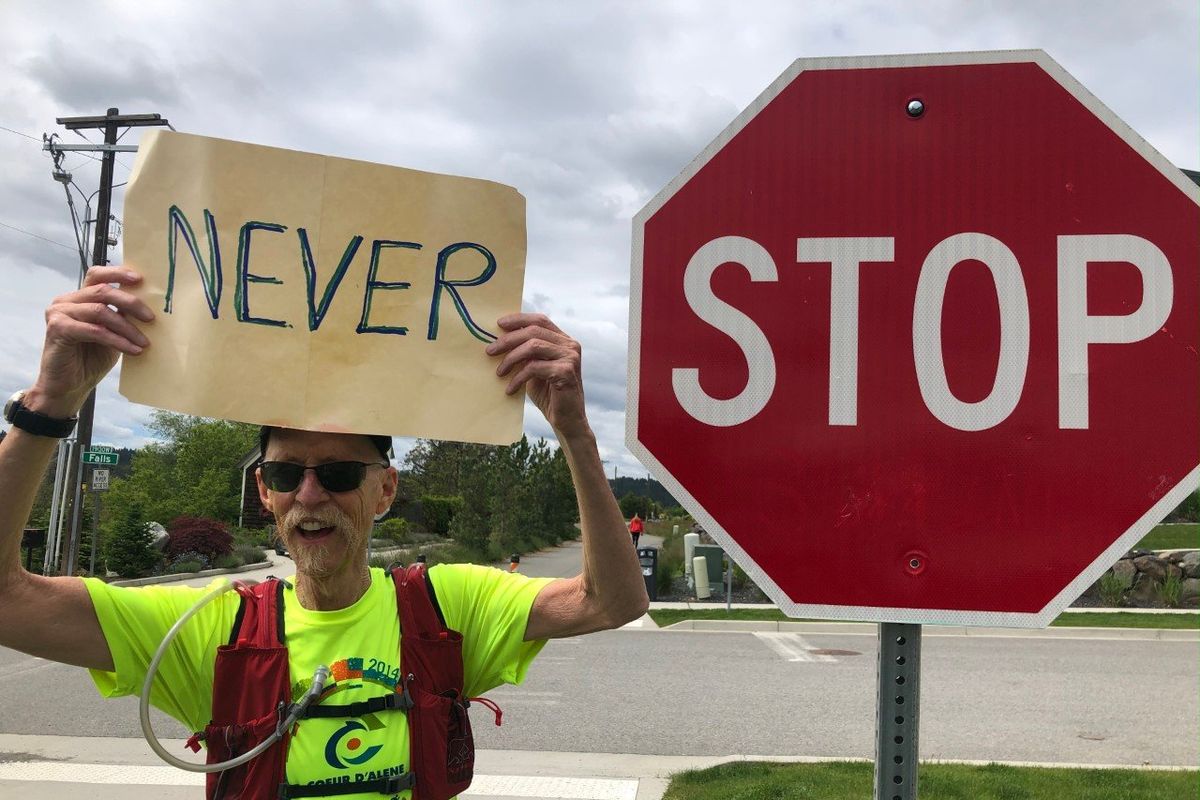John Harris, Spokane triathlete and mountaineer who continued competing after going blind, dies

When John Harris had a health setback related to his multiple bouts with cancer, including being left blind in his 60s, the question for his doctor remained the same.
“He would ask, ‘How much time do I have to take off running?’” Harris’ wife, Kathryn Harris, said. “Everything was a sports injury. His blindness stopped being the problem.”
John Harris, a U.S. Navy veteran, Chugach State Park ranger in Alaska, triathlete and marathoner, died Jan. 25. He was 67.
Harris spent two years in the Navy during the Vietnam War. He was aboard the USS Midway as it brought evacuees via helicopter from Saigon as United States forces pulled out of the country, his wife said.
Kathryn Harris didn’t meet John until he returned to Spokane in the late 1980s. By then, he’d already caught the running bug, serving as a park ranger at Chugach State Park near Anchorage. It wasn’t until he moved to San Diego, to finish his degree, that he became interested in triathlons.
“San Diego, at the time, was a big hub for triathlons,” Kathryn Harris said.
Like her husband, she enjoyed the outdoors. The couple completed triathlons and trained together, but Kathryn Harris said she wasn’t as fond of running as John, who’d learned to swim specifically to compete in the three-event races.
He would come to need her to keep his running habit going after he was hospitalized with a stomach issue in late 2015.
“When John came out of the hospital, he was completely blind,” Kathryn Harris said. “He was in a wheelchair and couldn’t stand without assistance.”
Kathryn Harris credits a team of physical therapists with getting her husband back to walking. Charlie Howlett worked with John Harris for close to six years and described him as “everything you want as a therapist.”
“I think he just exemplified everything right about humanity,” Howlett said. “He had a challenge, and he accepted it.”
While out to lunch a few months after his discharge from the hospital near downtown, John Harris said he’d like to head over to the trade show for Bloomsday, Spokane’s annual 12-kilometer road race.
“He decided that if he could tolerate the trade show, that we were going to walk Bloomsday,” she said. “We went in, and he decided he wanted to.”
John Harris walked with a cane that first race in May 2016, with Kathryn Harris leading him by the forearm. But their difference in height caused some discomfort, so they settled on a short length of climbing rope that Kathryn could grasp and help lead her husband. The couple also got a tandem bike so that John Harris could get at least two of the triathlon events in.
The coordination between the running pair took some getting used to. But John Harris began to feel more comfortable running than walking, his wife said.
“People didn’t know he was blind,” Kathryn Harris said. “They just thought we were a really cute couple, holding hands.”
The pair needed only a few verbal commands for their outings, usually on the Centennial Trail. Kathryn Harris would say “dip” when they came to a depression in the path, or “bump” if there was an incline .
On a recent walk with her daughter, Kathryn Harris said she was still calling out bumps and dips.
“You just learn what that person needs,” Kathryn Harris said of guiding her husband.
The couple became regulars at training groups organized by Spokane Fleet Feet, the running equipment retailer. Steve Warrington, manager of training groups for the store, said they were an “integral part” of the running community in town.
“He knew everybody, and everybody knew who they were,” Warrington said.
Running was a social balm for John Harris, in addition to its physical benefit, his wife said.
“Everybody talked to him, and he talked to everybody,” she said. “It took him out of that isolation.”
Until his most recent illness, John Harris continued to run. The couple’s favorite spot was along a stretch of the Centennial Trail past Mirabeau, on the way to the Washington/Idaho border. John Harris could hear the birds and the sounds of the Spokane River reverberating off the rocks while he pushed onward, his wife at his side.
“I feel like we were really successful in making life happy again, and running was a huge part of that,” she said.